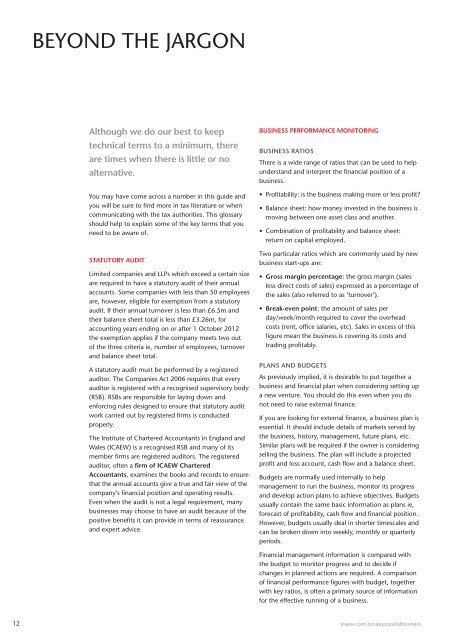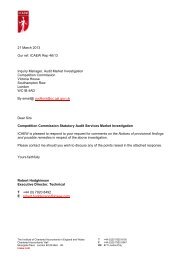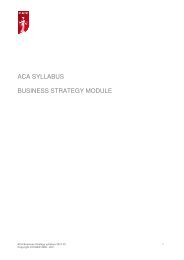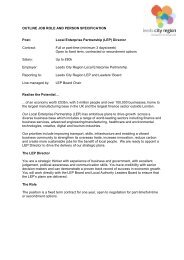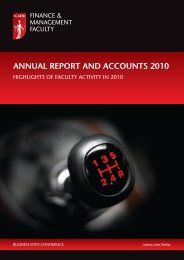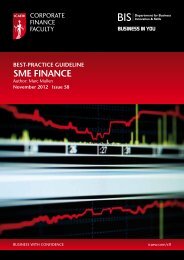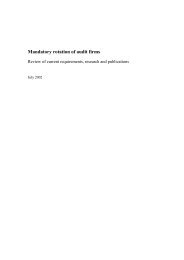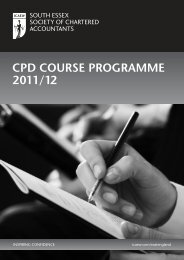RUN A SUCCESSFUL BUSINESS - ICAEW
RUN A SUCCESSFUL BUSINESS - ICAEW
RUN A SUCCESSFUL BUSINESS - ICAEW
You also want an ePaper? Increase the reach of your titles
YUMPU automatically turns print PDFs into web optimized ePapers that Google loves.
BEYOND THE JARGON<br />
Although we do our best to keep<br />
technical terms to a minimum, there<br />
are times when there is little or no<br />
alternative.<br />
You may have come across a number in this guide and<br />
you will be sure to find more in tax literature or when<br />
communicating with the tax authorities. This glossary<br />
should help to explain some of the key terms that you<br />
need to be aware of.<br />
STATUTORY AUDIT<br />
Limited companies and LLPs which exceed a certain size<br />
are required to have a statutory audit of their annual<br />
accounts. Some companies with less than 50 employees<br />
are, however, eligible for exemption from a statutory<br />
audit. If their annual turnover is less than £6.5m and<br />
their balance sheet total is less than £3.26m, for<br />
accounting years ending on or after 1 October 2012<br />
the exemption applies if the company meets two out<br />
of the three criteria ie, number of employees, turnover<br />
and balance sheet total.<br />
A statutory audit must be performed by a registered<br />
auditor. The Companies Act 2006 requires that every<br />
auditor is registered with a recognised supervisory body<br />
(RSB). RSBs are responsible for laying down and<br />
enforcing rules designed to ensure that statutory audit<br />
work carried out by registered firms is conducted<br />
properly.<br />
The Institute of Chartered Accountants in England and<br />
Wales (<strong>ICAEW</strong>) is a recognised RSB and many of its<br />
member firms are registered auditors. The registered<br />
auditor, often a firm of <strong>ICAEW</strong> Chartered<br />
Accountants, examines the books and records to ensure<br />
that the annual accounts give a true and fair view of the<br />
company’s financial position and operating results.<br />
Even when the audit is not a legal requirement, many<br />
businesses may choose to have an audit because of the<br />
positive benefits it can provide in terms of reassurance<br />
and expert advice.<br />
<strong>BUSINESS</strong> PERFORMANCE MONITORING<br />
<strong>BUSINESS</strong> RATIOS<br />
There is a wide range of ratios that can be used to help<br />
understand and interpret the financial position of a<br />
business.<br />
• Profitability: is the business making more or less profit?<br />
• Balance sheet: how money invested in the business is<br />
moving between one asset class and another.<br />
• Combination of profitability and balance sheet:<br />
return on capital employed.<br />
Two particular ratios which are commonly used by new<br />
business start-ups are:<br />
• Gross margin percentage: the gross margin (sales<br />
less direct costs of sales) expressed as a percentage of<br />
the sales (also referred to as ‘turnover’).<br />
• Break-even point: the amount of sales per<br />
day/week/month required to cover the overhead<br />
costs (rent, office salaries, etc). Sales in excess of this<br />
figure mean the business is covering its costs and<br />
trading profitably.<br />
PLANS AND BUDGETS<br />
As previously implied, it is desirable to put together a<br />
business and financial plan when considering setting up<br />
a new venture. You should do this even when you do<br />
not need to raise external finance.<br />
If you are looking for external finance, a business plan is<br />
essential. It should include details of markets served by<br />
the business, history, management, future plans, etc.<br />
Similar plans will be required if the owner is considering<br />
selling the business. The plan will include a projected<br />
profit and loss account, cash flow and a balance sheet.<br />
Budgets are normally used internally to help<br />
management to run the business, monitor its progress<br />
and develop action plans to achieve objectives. Budgets<br />
usually contain the same basic information as plans ie,<br />
forecast of profitability, cash flow and financial position.<br />
However, budgets usually deal in shorter timescales and<br />
can be broken down into weekly, monthly or quarterly<br />
periods.<br />
Financial management information is compared with<br />
the budget to monitor progress and to decide if<br />
changes in planned actions are required. A comparison<br />
of financial performance figures with budget, together<br />
with key ratios, is often a primary source of information<br />
for the effective running of a business.<br />
12<br />
icaew.com/runasuccessfulbusiness


